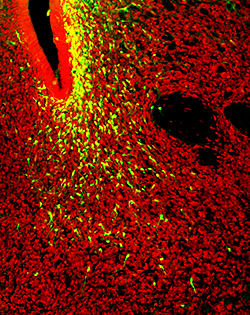There are many online sources that provide information on stem cells. Each question below has a few links with the most relevant information. The sources are from government agencies, the University of Maryland, and the International Society for Stem Cell Research.
Select a question to learn more:
What are Stem Cells?
Stem Cells: The Future of Medicine
 Stem cell research is transforming the future of medicine. Indeed, as we all begin life as a stem cell, it is through a highly complex series of events that those few stem cells, which are capable of self-renewal and differentiation, develop into all of the specialized cells found in our adult bodies. By studying these events we gain rare insights into how the human body is made. Stem cell research also holds amazing potential for restructuring the way we practice medicine: One day, stem cells may be used to replace or repair damaged tissues and organs and to dramatically alter how we treat diseases like cancer.
Stem cell research is transforming the future of medicine. Indeed, as we all begin life as a stem cell, it is through a highly complex series of events that those few stem cells, which are capable of self-renewal and differentiation, develop into all of the specialized cells found in our adult bodies. By studying these events we gain rare insights into how the human body is made. Stem cell research also holds amazing potential for restructuring the way we practice medicine: One day, stem cells may be used to replace or repair damaged tissues and organs and to dramatically alter how we treat diseases like cancer.
There are many areas in medicine in which stem cell research could have a significant impact. For example, there are a variety of diseases and injuries in which a patient's cells or tissues are destroyed and must be replaced by tissue or organ transplants. Stem cells may be able to generate brand new tissue in these cases, and even cure diseases for which there currently is no adequate therapy. Diseases that could see revolutionary advances include Alzheimer's and Parkinson's disease, diabetes, spinal cord injury, heart disease, stroke, arthritis, cancer, and burns.
Stem cells could also be used to gain a better understanding of how genetics work in the early stages of cell development. This can help scientists understand why some cells develop abnormally and lead to medical problems such as birth defects and cancer. By understanding the genetic basis for cell development, scientists may learn how to prevent some of these diseases.
Finally, stem cells may be useful in the testing and development of drugs. Because stem cells can be used to create unlimited amounts of specialized tissue, such as heart tissue, it may be possible to test how drugs react on these specialized tissues before trying the drugs on animals and human subjects. Drugs could be tested for effectiveness and side effects more rapidly.
The University of Maryland School of Medicine is at the forefront of research and development of stem cells for these purposes. Through its University of Maryland Center for Stem Cell Biology and Regenerative Medicine, led by Dr. Curt Civin, the School is exploring how to manipulate stem cells to allow for much better transplantation and transfusion therapies. Its scientists are also working to understand how stem cells contribute to diseases in order to develop ways to improve conventional treatment and prevention of these disorders.
What patient resources are available at the University of Maryland Medical Center?
- University of Maryland Medical Center—Patient Resource Center
- Centers and Services (Centers of Excellence, Departments, and Conditions & Topics)
- “Find A Doctor” at the University of Maryland
What clinical trials are available?
What should I consider before enrolling in a clinical trial?
